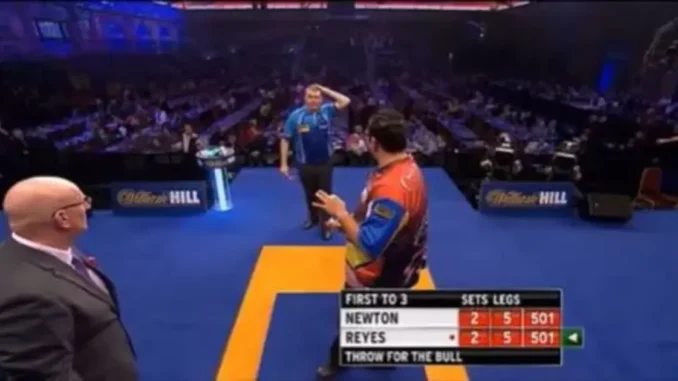
The 2025 PDC World Darts Championship at Alexandra Palace, a glittering spectacle of precision and passion, was rocked by an unprecedented controversy when a referee’s oversight during a second-round match between Ryan Searle and Karel Sedlacek led to a rare public statement from the Professional Darts Corporation (PDC). The incident, described by officials as an “unfortunate situation,” involved a critical misapplication of tournament rules, prompting a heated debate about officiating standards in darts’ flagship event. As the sport continues its meteoric rise, this blunder has cast a spotlight on the pressures faced by officials and players alike on the biggest stage.
The drama unfolded during Searle’s 3-1 victory over Sedlacek, a match that showcased the world number 19’s resilience despite his struggles with astigmatism, a condition that affects his vision. Searle, known as “Heavy Metal,” relies on contact lenses to enhance his game but occasionally needs to confirm dart landings with the referee. “It has not been easy,” Searle admitted in a 2023 interview, noting how his condition once limited him to a world ranking of 54 before climbing to 15 with improved sight. In this match, however, the issue wasn’t Searle’s vision but a referee’s lapse in enforcing a key rule governing the sequence of throws in a deciding leg. The PDC’s rulebook, overseen by the Darts Regulation Authority (DRA), stipulates that in a tied set, the player who threw first in the previous leg throws second in the decider, ensuring fairness. The referee, Owen Binks, failed to enforce this, allowing Sedlacek to throw first incorrectly.
The error, captured on Sky Sports’ live broadcast, sparked immediate backlash from fans and players. Searle, unaware of the mistake during the match, later expressed frustration, echoing his earlier sentiments about rule changes: “What is the point of the ProTour Order of Merit? The one that shows the true form and consistency of players.” While Searle’s victory stood, the PDC issued a swift statement acknowledging the oversight. “Due to an unfortunate situation, the incorrect player threw first in the deciding leg,” the statement read, clarifying that the referee had been reminded of the rule and that no further action would be taken since the match result was unaffected. The PDC emphasized its commitment to fair play, noting that the DRA rulebook, updated in January 2024, governs all tournaments to maintain consistency.
This incident wasn’t the first time officiating has come under scrutiny at the World Championship. In 2007, a similar controversy arose during the iconic final between Phil Taylor and Raymond van Barneveld, where a bull-up to determine the first throw in a sudden-death leg became a focal point. Van Barneveld used Taylor’s outer bullseye as a marker to hit the bullseye, securing the throw and ultimately the title. The PDC’s rules, designed to prevent such disputes, require players to alternate throws in tied situations, a protocol Binks overlooked. Veteran referee Russ Bray, known for his raspy “180” calls, later commented on the incident, saying, “It’s a high-pressure environment, and mistakes can happen, but we strive for perfection.” Bray, one of four PDC match referees alongside Binks, Paul Hinks, and George Noble, underscored the challenges of officiating in front of a raucous Ally Pally crowd of 3,200.
The fallout from the error has reignited discussions about enhancing officiating protocols. After a 2019 Grand Slam of Darts clash between Gary Anderson and Gerwyn Price, the PDC floated the idea of adding an extra referee to monitor player behavior, a proposal that gained traction amid recent controversies like James Wade’s “Fartgate” and Rob Cross’s gesture-related fine. “Darts is still in a constant state of development,” noted a PDC spokesperson, hinting at potential reforms to ensure accuracy. The incident also highlighted the sport’s growing pains as it evolves from a pub game to a global phenomenon, with the 2025 World Championship boasting a £2.5 million prize fund and a £1 million top prize for 2026.
For Searle, the victory was bittersweet, advancing him to face top seed Luke Humphries, who has navigated his own controversies this year, including a handshake snub from Wade at the UK Open. Sedlacek, gracious in defeat, acknowledged the error but focused on his performance, saying, “It’s tough, but you move on.” As the tournament progresses, with Luke Littler and Michael van Gerwen set to clash in a blockbuster semi-final, the PDC’s swift response aims to restore focus on the darts. Yet, this “unfortunate situation” serves as a reminder that even in a sport of pinpoint precision, human error can steal the spotlight, leaving fans and players clamoring for clarity on the game’s grandest stage.
Leave a Reply